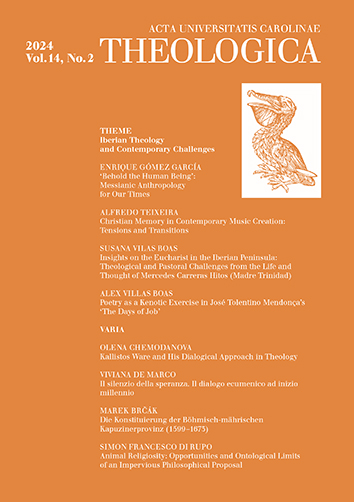AUC Theologica is a peer-reviewed journal for theology published twice a year. As we publish original papers in English, German, French, and Italian, our mission is to serve as a platform both for Czech researchers, who can present their research results in these languages, and for international contributors, who are invited to enter the academic theological discussion in the heart of Europe.
The journal focuses on a wide range of theological disciplines, such as systematic theology, biblical studies, patristic studies, pastoral and spiritual theology, religious education, church history, etc. Within these fields, the journal seeks to reflect the current theological questions and problems, which often requires interdisciplinary approaches. Supporting the intersection of various theological disciplines, we thus also welcome theological papers touching other academic fields including philosophy, sociology, literary studies, and science.
Each issue consists of two sections. The thematic section presents papers of the same focus. The section called ‘Varia’ invites papers dealing with various theological themes from the perspective of all Christian traditions. Our current and past issues are approachable for free on this website in the form of Open Access.
AUC THEOLOGICA, Vol 13 No 2 (2023), 47–63
From Dangerous Memory to Dangerous Hope: Reading the Theology of Johann Baptist Metz
Petr Jandejsek
DOI: https://doi.org/10.14712/23363398.2023.25
published online: 23. 02. 2024
abstract
From the perspective of theological anthropology, the article aims to explore the possibility of hope in the contemporary world. It draws on the work of the Catholic theologian Johann Baptist Metz and presents the struggle for hope in three areas that were central to Metz and his time. All relate to the question of suffering. Specifically, these are Metz’s conversation with Marxism, in which he develops an eschatological concept of creative hope; the topic of post-Holocaust theology, which must speak out on behalf of the victims of violence and at the same time work with the silence that remains after the victims no more exist; and, finally, a post-idealist approach in theology that will be able to critically view its own Eurocentrism. Contemporary contexts are in some ways different from Metz’s. Still, one can benefit from his honest efforts, at least methodologically. The article concludes by relating Metz’s ideas to some selected contemporary issues, such as the relationship between activism and spirituality. The article notes a certain affinity between Metz’s thought and the pontificate of the current Pope Francis, especially with regard to a commitment to reality.
keywords: Johann Baptist Metz; Hope; Theological anthropology; Theology and Marxism; Theology after Auschwitz; European theology

From Dangerous Memory to Dangerous Hope: Reading the Theology of Johann Baptist Metz is licensed under a Creative Commons Attribution 4.0 International License.
148 x 210 mm
periodicity: 2 x per year
print price: 100 czk
ISSN: 1804-5588
E-ISSN: 2336-3398
